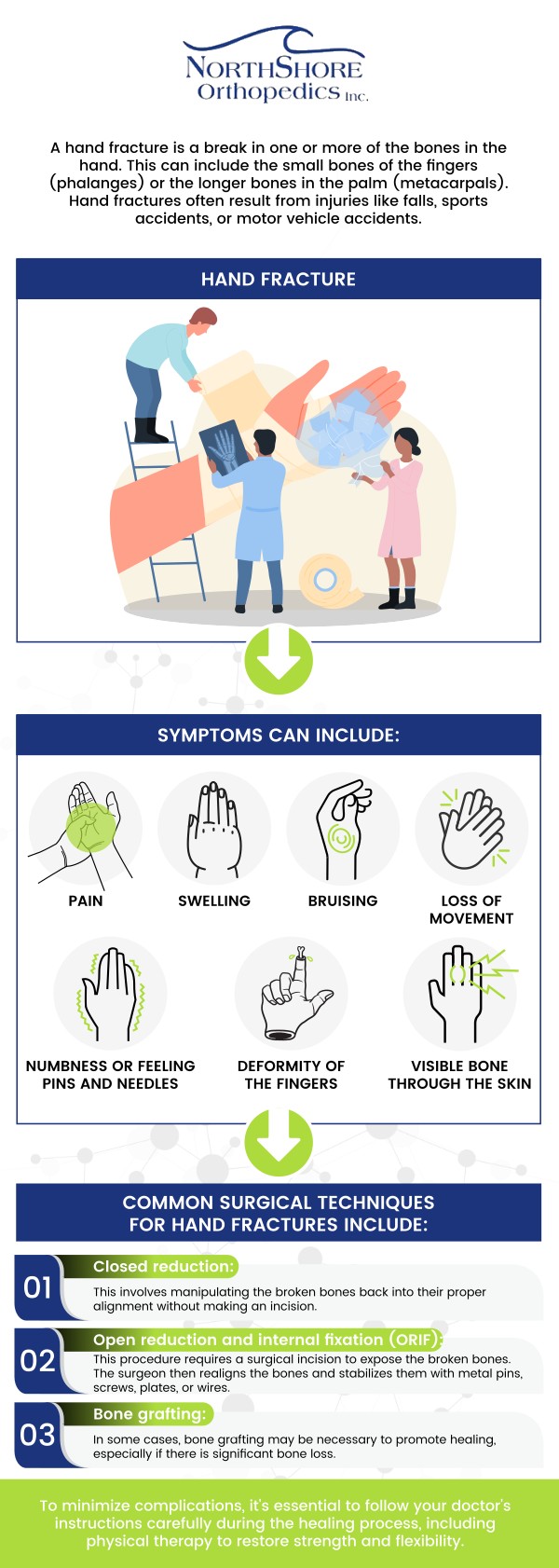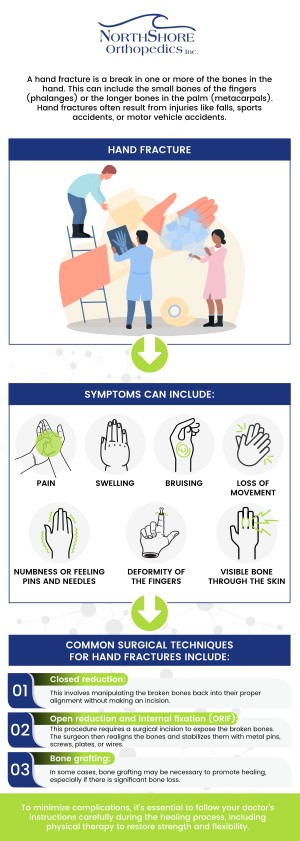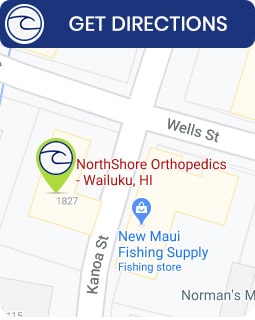Orthopedic Hand Surgeon in Maui, Wailuku, HI
Orthopedic hand surgeons can treat both acute and chronic hand injuries and conditions. If you’d like to learn more about hand surgeries or are looking for a skilled hand surgeon to perform your surgery, we can help at NorthShore Orthopedics! Board-certified orthopedic surgeon Dr. Charles Soma, MD provides comprehensive and specialized care. Contact us today or schedule an appointment online. We are conveniently located at 1827 Wells St #1, Wailuku, HI 96793.




Table of Contents:
Why would I need to see an orthopedic hand surgeon?
What hand conditions require surgery?
What is the success rate of orthopedic hand surgeries?
What to expect at your visit with an orthopedic hand surgeon?
What is a hand surgeon called?
What is the most common hand surgery?
How many hours does hand surgery take?
What are the types of hand surgeries?
Most hand injuries improve with minimal medical intervention. Still, severe hand injuries can happen that require surgery. In these cases, you want to find a skilled hand surgeon who will treat the injury or condition well and ensure proper function continues after you recover. Learn more about hand surgeons and hand surgeries below!
An orthopedic surgeon is a specialized medical professional with the extensive knowledge and necessary skills to diagnose, operate, and treat conditions related to the musculoskeletal system (bones, joints, ligaments, tendons, and muscles). Some orthopedic surgeons specialize even further, deciding to tackle issues specifically within the hand. With that known, any prolonged or persistent pain in the hand region, such as the fingers, wrist, forearm, etc., may be best addressed with their help. Additionally, poor functionality of any aspect of the hand from deformities, pain, limited mobility, or any other abnormality may be a fine reason to consult an orthopedic hand surgeon.
Numerous conditions may transpire within the hand that requires surgical intervention. Conditions that require surgery often affect either the structure, function, or appearance of the hand and can arise due to injuries, congenital deformities, or degenerative diseases some of the most common conditions that often require surgery include carpal tunnel syndrome, trigger finger, basal joint arthritis, or ganglion cysts. The list of such conditions that require surgery is extensive, but rest assured that a physician will inform you of the implications of your specific hand condition. On another note, the surgeries to address these issues are largely performed by orthopedic surgeons, however, there are certainly surgeons of different disciplines, particularly general surgeons, plastic surgeons, or neurosurgeons, who may have training in dealing with the anatomy of the hand. Do keep in mind that not every hand condition will require surgery, and for some conditions, surgery may only be performed when a condition is quite severe, making it all the more important to consult the proper medical professionals.
The success rate of hand surgeries will vary depending on the specific condition, the severity of the said condition, the difficulty of the surgery, as well as the rehabilitation or post-operative care, and the patient’s health at large. With that being said, most of the common hand surgeries generally have a very high rate of success, with many being upwards of 90% success rate, with carpal tunnel syndrome and trigger finger release among that set. It should also be known that success in terms of hand surgeries may be defined slightly differently than initially thought, as it typically takes into account all of the following: the absence of complications, the initial issue being solved, reduction in pain, restoration of function, and patient satisfaction. Seeing that all of these factors must be met for an operation to be deemed successful, the outlook for patients in need of hand surgery is quite good. Do keep in mind that while the success rate for the most common cases is quite high, the hand is composed of very delicate and complex anatomy, making some procedures more difficult than others, with one example being microvascular surgery or replantation, which involves reattaching fingers or hands. So, while there are no guarantees of success when it comes to surgery, you may find comfort in knowing that the overwhelming majority of common operations of the hand are successful.
The first visit to an orthopedic surgeon will consist of a comprehensive examination and plan for hand-related issues. First, there will be a detailed review of medical history which includes looking at previous injuries, illnesses, operations, and medications. Following this, a discussion about the symptoms being experienced will occur and lead to a physical examination of the hand to note any potential abnormalities. If there is no discernable information from the physical examination, imaging may be needed. If no imaging was done beforehand and is needed, the appropriate imaging will be performed. If imaging was performed before the visit, the surgeon will discuss the findings and explain the diagnosis and treatment options. If surgery is a recommended option, they will explain the risks, benefits, outcomes, and recovery. Typically, it is more common to have already met with a physician, likely a primary care or emergency physician, before meeting with a more specialized medical professional to ensure that it is a condition relevant to their expertise beforehand. Our dedicated team of specialists is ready to assist you and provide you with the personalized care you deserve.
Surgeons who specialize in hand surgery are generally known as orthopedic surgeons. An orthopedic surgeon is a medical specialist who is expertly trained to diagnose, treat, and manage injuries and conditions affecting your musculoskeletal system, of which your hand is a part. Your musculoskeletal system includes various tissues in your body, including your bones, cartilage, ligaments, tendons, and other tissues — all tissues that are present within your hand.
Orthopedic hand surgeons can treat both acute and chronic hand injuries and conditions. Acute hand injuries are those that occur due to an accident and cause sudden pain. In contrast, chronic hand injuries occur over time due to repetitive stress with pain that slowly builds and gets worse. Thus, acute hand injuries cause pain for a short amount of time, while chronic hand injuries cause pain for three months or longer.
Some acute hand injuries that orthopedic hand surgeons can treat include fractures, torn ligaments or tendons in your hand, and others. Some chronic hand injuries that orthopedic hand surgeons can treat include carpal tunnel syndrome, trigger finger, basal joint arthritis, and others.
To treat such conditions surgically, orthopedic hand surgeons must go through rigorous education and training. Their education and training involve an undergraduate Bachelor of Sciences (B.S.) degree, four years of medical school, and five years in a residency training program. After completing the residency, many orthopedic surgeons further their training with a fellowship program to specialize in a specific area of orthopedic surgery, such as hand surgery.
One of the most common hand surgeries is carpal tunnel release surgery, as this chronic condition is common among many different people. Carpal tunnel syndrome occurs when the median nerve that runs through your hand and wrist becomes compressed or pinched. As a result, patients with carpal tunnel syndrome experience pain, numbness, tingling, and burning sensations in their wrists and hands.
With carpal tunnel release surgery, an orthopedic hand surgeon makes an incision into your palm and cuts through the transverse carpal ligament to relieve the pressure on the compressed median nerve, removing whatever is causing the compression and making more room for the nerve to travel through. It will take a few weeks for you to recover and return to light activity with your hand, and several more weeks to return to more vigorous activity with your hand.
The number of hours your hand surgery will take depends on the type of surgery you’re having done. For example, some hand surgeries may take as little as 20 minutes to complete, while others will take longer—around one to two hours. That said, most hand surgeries should not take longer than one hour to perform.
There are various types of hand surgeries that orthopedic hand surgeons can perform. Here is a list of some of those hand surgeries:
• Carpal tunnel release surgery
• De Quervain’s Tenosynovitis surgery
• Trigger finger release surgery
• Joint replacement for severe arthritis
• Tendon repair
If you’d like to learn more about hand surgeries or are looking for a skilled hand surgeon to perform your surgery, we can help at NorthShore Orthopedics! Call us today or visit our website to learn more about our hand surgery options or to schedule a consultation with our orthopedic surgeon. We serve patients from Maui, Wailuku HI, Lahaina HI, Kahului HI, Kihei HI, Wailuku HI, Kula HI, Makawao HI, Paia HI, Wailea HI, Haiku HI, and Waihee-Waiehu HI.

Additional Services You May Like
▸Fractures & Sprains
▸Knee & Shoulder Injury
▸Platelet Rich Plasma PRP
▸Hand Injury and Surgery
▸Sports Medicine
▸Arthritis Treatment
▸Athletic Injury Recovery
▸Direct Orthopedic Care for Fractures
▸Male Hormonal Evaluations
▸Strains and Sprains
▸Urgent Care
▸X-Ray
▸Worker Comp
▸Back and Neck Pain
▸Wound Management
▸Semaglutide
▸Regenerative Cell Therapy
▸Microneedling With Prp
▸Stem Cell Therapy
▸Knee Surgeon
▸Shoulder Orthopedic Surgeon

Additional Services You May Like
▸Fractures & Sprains
▸Knee & Shoulder Injury
▸Platelet Rich Plasma PRP
▸Hand Injury and Surgery
▸Sports Medicine
▸Arthritis Treatment
▸Athletic Injury Recovery
▸Direct Orthopedic Care for Fractures
▸Male Hormonal Evaluations
▸Strains and Sprains
▸Urgent Care
▸X-Ray
▸Worker Comp
▸Back and Neck Pain
▸Wound Management
▸Semaglutide
▸Regenerative Cell Therapy
▸Microneedling With Prp
▸Stem Cell Therapy
▸Knee Surgeon
▸Shoulder Orthopedic Surgeon





